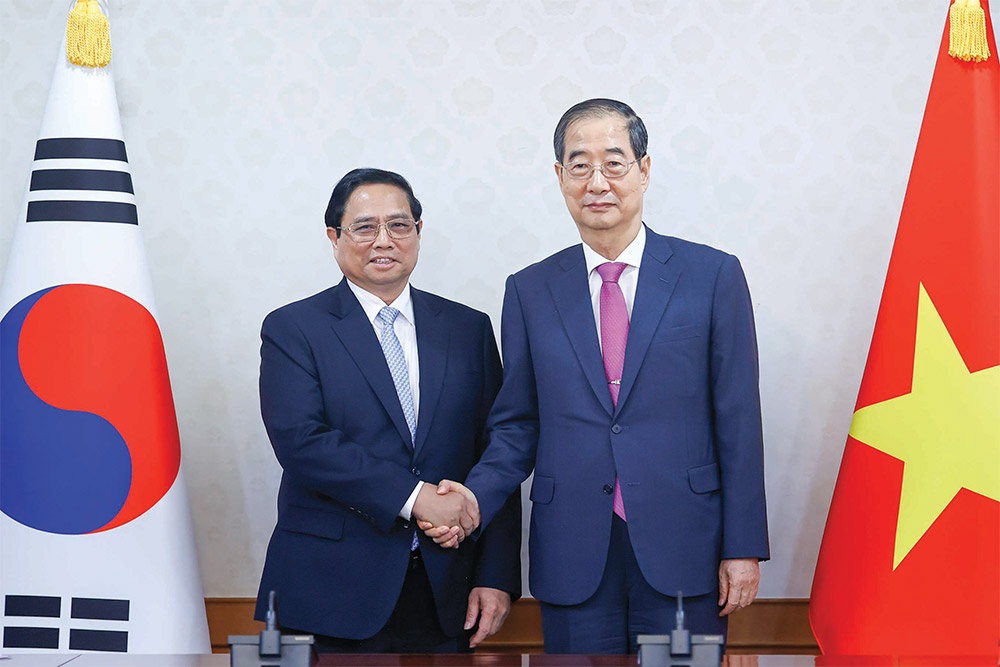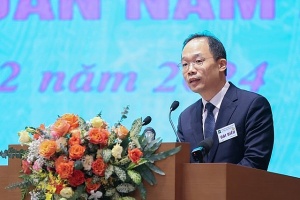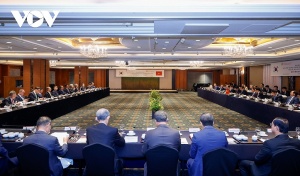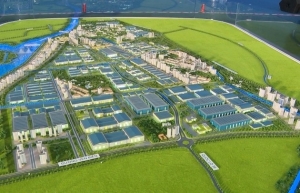South Korean groups invited to expand further in Vietnam
One of the main goals of Prime Minister Pham Minh Chinh’s official visit to South Korea last week was to amplify bilateral economic ties with an expansion of bilateral trade and investments. Both nations have committed to reach a two-way trade turnover of $100 billion in 2025 and $150 billion in 2030.
 |
| Vietnam’s Prime Minister Pham Minh Chinh (left) and his South Korean counterpart Han Duck Soo ,Photo: Nhat Bac |
The latest figures from the General Statistics Office showed that the Vietnam-South Korea trade turnover in the first six months of this year reached $38.4 billion, including Vietnamese exports of $12.2 billion – up 10.4 per cent on-year, and imports of $26.2 billion – up 7.4 per cent on-year. Last year, both countries’ total trade turnover hit $76.1 billion, lower than the $86.4 billion recorded in 2022. South Korea is Vietnam’s third-largest trade partner, after the US and China. It is also Vietnam’s second-largest import market, after China.
To implement the freshly set trade goal, leaders agreed to closely cooperate to effectively implement bilateral and multilateral economic cooperation mechanisms such as the Vietnam-Korea Free Trade Agreement, the Regional Comprehensive Economic Partnership, and the Indo-Pacific Economic Framework for Prosperity, including the early signing of a mutual recognition agreement on an authorised economic operator in 2024.
“The two sides encourage South Korean businesses to expand investment into Vietnam in key industrial sectors and future industrial sectors such as AI, the green and circular economy, semiconductors, environmental friendly energy, biotechnology, 5G, and smart cities,” read a press release after the visit. “Both sides also agree to increase cooperation in boosting South Korean investments in Vietnam to develop a stable core mineral supply chain.”
South Korea’s Prime Minister Han Duck Soo said that their enterprises see Vietnam as a market with big potential, and that more better conditions must be created for bilateral trade and investment flows, including South Korean investments in Vietnam’s key projects such as energy and liquefied natural gas.
South Korea also commits to support Vietnam in training high-quality human resources in service of its semiconductor industry and high-tech industry, as well as in assisting Vietnam in developing its cultural industry.
PM Chinh pledged to help foreign companies, including South Korean ones, do business in Vietnam, emphasising that the country considers reforms to its business environment, administrative process and regulations important.
“All South Korean conducting business and investment activities in Vietnam are ensured social and political stability, with a fair, favourable, and healthy business and investment environment,” PM Chinh said.
Vietnam encourages South Korean enterprises to invest into its territory in the emerging sectors of the digital economy, green economy, circular economy, and sharing economy, as well as semiconductors, AI, hydrogen, and culture and entertainment, the PM added.
Last week also witnessed the signing of nine cooperation documents between the ministries, agencies, and organisations of both nations in the sectors of economy, trade, investment, education, development cooperation, startup ecosystem exchange, competition, and consumer protection.
In an example, Lotte, whose total revenue in 2022 reached $6.29 billion, also wishes to increase its presence in Vietnam, where it has been investing since 1996. Lotte chairman Shin Dong Bin told PM Chinh said that the group planned to increase its investment in the country. Currently, it is implementing the Lotte Thu Thiem smart city in Ho Chi Minh City, but awaiting the area’s land price to be fixed before it can speed up construction of the project.
Last September, Lotte inaugurated its $650 million Lotte Mall Tay Ho in Hanoi, which has received seven million visitors thus far.
In another case, Hyundai Motor Group’s executive chairman Euisun Chung said last week that the group wants to invest more in Vietnam, and especially transfer new technology to Vietnam in the vehicle industry.
Hyundai has invested $415 million in Vietnam, employing 2,300 workers, with an estimated revenue reported to be $2.6 billion last year. It has also cooperated with and transferred tech to Vietnam’s THACO to manufacture and assemble assorted Kia products in the south-central province of Quang Nam.
Figures from the Vietnamese Ministry of Planning and Investment showed that accumulatively as of June 20, total registered investment capital from South Korea into Vietnam sat at $87.46 billion for more than 10,000 projects, enabling South Korea to keep its position as the top foreign investor in Vietnam.
In the January-June 20 period, total newly registered and newly added capital and stake acquisition and capital contributions from South Korean investors in Vietnam reached over $1.4 billion, up 63 per cent on-year.
According to the Korea Chamber of Business in Vietnam, many South Korean groups are planning to invest heavily into Vietnam, worth up to billions of US dollars, in many sectors such as renewable energy, sci-tech, IT, finance and banking, and the environment, among others. Their projects will also contribute to expanding trade between both economies.
Chamber chairman Hong Sun said, “Vietnam’s investment and business climate has been remarkably improving. One of the most important factors of an investment market is favourable legal regulations so that foreign investors can implement their investment and business projects.”
According to Sun, Vietnam’s Law on Investment and Law on Enterprises have been continuously supplemented and adjusted in a direction more favourable to investors, helping Vietnam woo more foreign investment. Moreover, the legal provisions in the relevant laws highlight the incentives for investors with large projects and in investment priority of the government.
“This is one of the key factors that has helped Vietnam draw in many large foreign investors,” Sun said.
Within the framework of his official visit to South Korea last week, PM Chinh also attended a ceremony in Seoul marking 30 years since Vietnam Airlines launched its first direct flight between Vietnam and South Korea, as well as welcoming the 15 millionth passenger on the route.
The first direct air route, linking Ho Chi Minh City to Seoul, served as an important bridge promoting socioeconomic and cultural exchanges between the two countries.
Vietnam Airlines and Korean Air also signed an MoU on cooperation in improving aviation services in the two countries.
 | South Korean diplomat outlines strategies to enhance Vietnam's stock market In a conference on February 28 to outline the objectives for the development of Vietnam's securities market in 2024, Sang Key Yoon, Commercial Counsellor at the Embassy of South Korea in Vietnam, detailed a vision for bolstering the Vietnamese stock exchange. |
 | South Korean conglomerates seek investment framework for wind and gas energy At a forum in Seoul on July 1, leaders of some South Korean conglomerates expressed their desire for the Vietnamese government to establish mechanisms and provide legal and financial support to facilitate investments and the completion of wind and gas power projects. |
 | Vietnam still a magnet for South Korean investors Vietnam remains a magnet for major South Korean investors, and a basis for them to reach out globally, nearly 10 years after a major free trade deal between the pair materialised. |
What the stars mean:
★ Poor ★ ★ Promising ★★★ Good ★★★★ Very good ★★★★★ Exceptional
Related Contents
Latest News
More News
- SK Innovation-led consortium wins $2.3 billion LNG project in Nghe An (February 25, 2026 | 07:56)
- THACO opens $70 million manufacturing complex in Danang (February 25, 2026 | 07:54)
- Phu Quoc International Airport expansion approved to meet rising demand (February 24, 2026 | 10:00)
- Bac Giang International Logistics Centre faces land clearance barrier (February 24, 2026 | 08:00)
- Bright prospects abound in European investment (February 19, 2026 | 20:27)
- Internal strengths attest to commitment to progress (February 19, 2026 | 20:13)
- Vietnam, New Zealand seek level-up in ties (February 19, 2026 | 18:06)
- Untapped potential in relations with Indonesia (February 19, 2026 | 17:56)
- German strengths match Vietnamese aspirations (February 19, 2026 | 17:40)
- Kim Long Motor and AOJ Suzhou enter strategic partnership (February 16, 2026 | 13:27)

 Tag:
Tag:




















 Mobile Version
Mobile Version